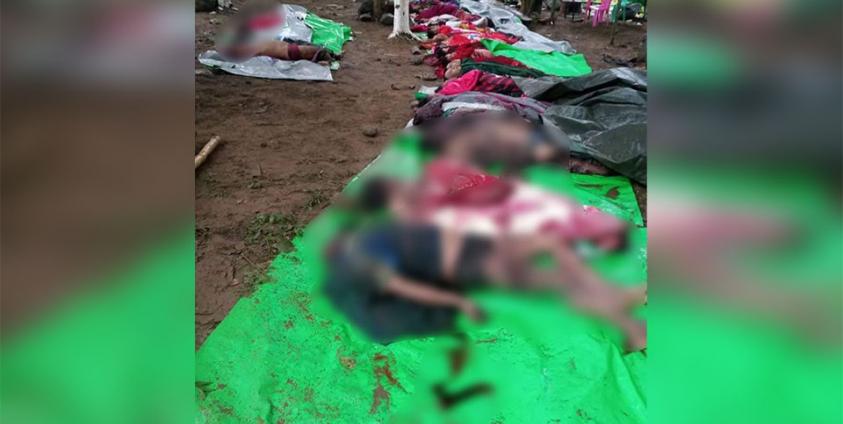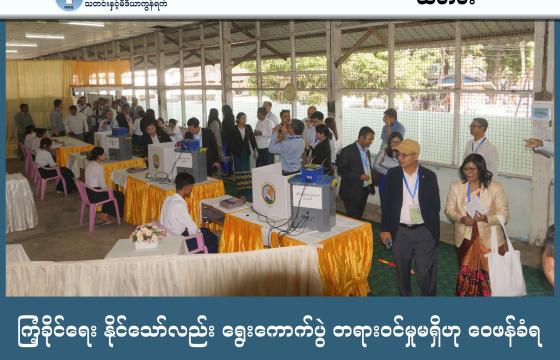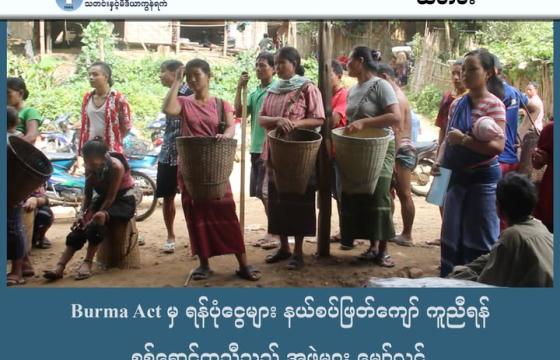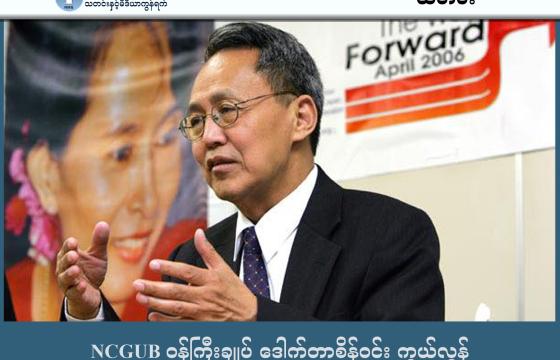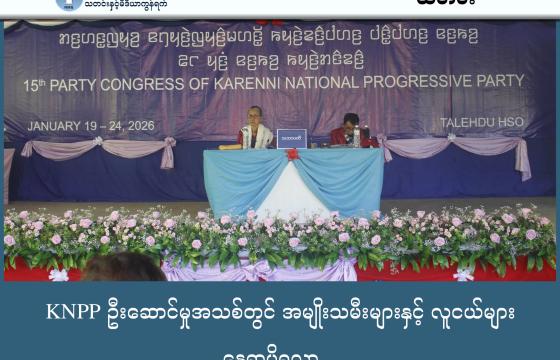“First we heard the planes flying in the night. Then we heard the shells exploding. We assumed there was an aircraft over there, but that the Burma Army (BA) had fired artillery, and we prayed that the shells that were fired landed where there were no people and no one was injured.
However, our prayers weren't answered. It turned out to be a very horrific incident and a great loss (of human life),” shared Brang Tawng from Hpakant about the regime's recent massacre at a concert in Kachin State.
“Many people were killed during the BA's airstrike because three bombs were dropped on the open-air music concert,” Ja Tawng, also from Hpakant, has told NMG.
Civilians, business people and officials of the Kachin Independence Organisation (KIO) and its armed wing, the Kachin Independence Army (KIA), had gathered in A Nang Pa to celebrate the 62nd anniversary of the KIO when three jet fighters attacked at around 8:30pm on 23 October.
Over 60 people were killed, including the famous Kachin singer Aurali, who was performing at the time, and some of the bodies blown apart by the shells couldn't be identified by rescue workers. Many people were injured in the attack.
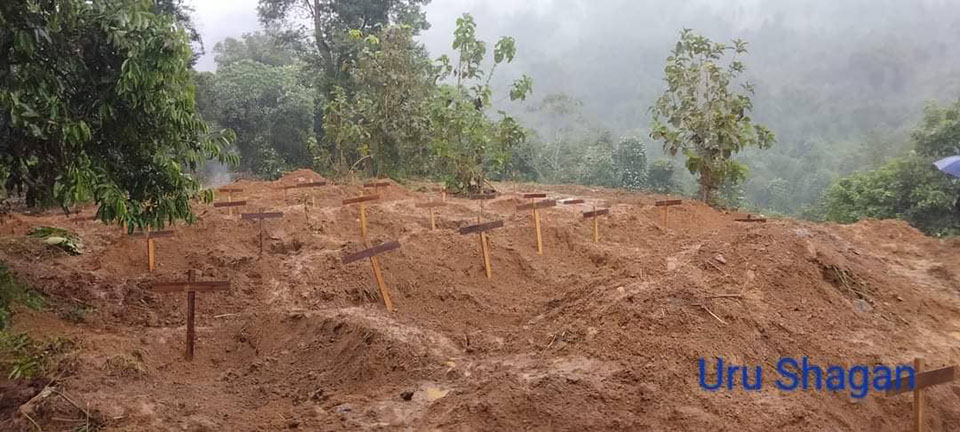
War Crimes
Many international organisations, political analysts and other ethnic armed groups have condemned the regime's unprecedented and unprovoked airstrike on the civilian assembly in Hpakant Township.
Amnesty International’s Deputy Regional Director Hana Young said: “We fear this attack is part of a pattern of unlawful aerial attacks by the military, which have killed and injured civilians in areas controlled by armed groups. The military has shown ruthless disregard for civilian lives in its escalating campaign against opponents. It is difficult to believe the military did not know of a significant civilian presence at the site of this attack.”
KIO spokesman Col Naw Bu and political analyst Than Soe Naing have called the bombing a war crime. “They already knew that there were many civilians there, and yet they committed it on purpose,” Naw Bu said. Than Soe Naing said “it's terrorism because civilians were killed in abusy area where there was no fighting.”
The Geneva Conventions define war crimes as “intentionally killing of civilians”, “unnecessarily destroying civilian property” and “for any individual that is part of the command structure who orders any attempt to committing mass killings”.
Maj Gen Gunmaw, the vice chairperson of the Kachin Independence Council, wrote on his Facebook page: “The KIO committee doesn't recognise people who support the Burmese government as enemies, but the BA have been attacking civilians and other local people in A Nang Pa as if they were their enemies.” He said the KIA doesn't maintain a camp in A Nang Pa, where there are some shops and places where travellers can temporarily stay, so it's not a legitimate target. “We use to teach youths to not commit the kind of mistakes that can never be undone. Now that mistake has been made by a distinguished older man,” he said, implying the regime leader Min Aung Hlaing.
Junta Obstructs Wounded Civilians From Reaching Hospitals
Many people who were seriously injured during the airstrike died after soldiers prevented rescuers from taking them to hospitals in Hpakant and Myitkyina. According to Naw Bu, the BA blocked all roads to A Nang Pa and inspected everyone at their checkpoints to prevent those injured during the attack from gaining access to outside medical facilities. “Our paramedics did their best to save as many people with the medicines (and equipment) available.” According to civilian volunteer teams, the army threatened action against private hospitals and clinics if they treated the injured and sent soldiers to inspect these facilities. “We tried to negotiate with them at the Gansi (aka Kansi) checkpoint. They didn't allow us to collect the bodies in A Nang Pa or send ambulances and volunteer vehicles to rescue the injured there,” a local volunteer said on the condition of anonymity. His team was only able to recover two bodies from the site of the attack, which were sent to Myitkyina on 24 October.
The military blocked all roads in Hpakant and prevented medicine from being delivered to A Nang Pa. Some people bled to death after they weren't able to get help. Families were denied the right to hold funeral services and bury their loved ones, and soldiers patrolled the family homes of musicians who performed during the concert.
Response From Ethnic Armed Groups
A day after the attack, Maj Gen Tawn Mrat Naing, commander-in-chief of the Arakan Army (AA), sent a letter of condolence for everyone killed in the attack. He wrote on Facebook that the bombing demonstrated the need for all the groups to be united in the fight against the fascist military regime. “How many more times must we have to mourn the innocent? How many more heroes have to give their lives?”
Gunmaw wrote on Facebook: “All the sadness and tears will become an immeasurable investment (for the revolution).”
The KIO promised to use the losses to increase its “strength” and “accelerate the revolution against the military dictators”.
Three Brotherhoods Alliance—AA, the Ta'ang National Liberation Army and the Myanmar National Democratic Alliance Army—called for unity and a clear plan to defeat the military junta.
The alliance said that none of the ethnic armed groups should fall for the junta's tricks and that the “BA air strike on A Nang Pa is a war crime and a crime against humanity”.
The United Wa State Party said that it has “closely observed the consequences of the BA air strike on civilians”, describing it as “a bitter and brutal incident”. The Wa armed group called on all armed groups to respect human rights, protect women and children, avoid fighting and resolve political problems peacefully.
The All Burma Students' Democratic Front (ABSDF) strongly condemned the bombing, which it described as “premeditated”. “All of the ethnic peoples are suffering the consequences of the military coup and facing many problems,” ABSDF said, pledging to stand together with them. The Burma Peace Process Steering Team (PPST), formed by the groups that signed the Nationwide Ceasefire Agreement, called the regime's attacks against civilians in Kachin State and Sagaing Region a “barricade” to resolving the country's long-standing problems through political dialogue. “The military's space has increased while the space for political dialogue has become narrower” which is very bad, said Saw Kyaw Nyunt, PPST spokesperson. “This isn't anoptimistic action to resume political dialogue.”
Regime Claims No Civilian Fatalities
Two days after the BA airstrikes killed scores of innocent people, the Office of the Commander- in-Chief of the Defence Services stated on its website that no civilians had been harmed in the attack and that the air force had carried out the strikes in accordance with the appropriate rules of engagement. The regime's mouthpieces, the Myanma Ahlin and the Mirror newspapers and Myawaddy TV, published this false report, which was then spread by other pro-military groups and individuals on social media.
Kachin Will Never Forget
Since the coup last year, BA has frequently flown airstrikes on Hpakant Township and other
areas in Kachin State to target the KIA, the People's Defence Forces and civilians. Connectivity has been suspended in the township, preventing journalists from obtaining information about these attacks. At the same time, the dictatorship spreads misinformation to cover up its war crimes. Despite this, local Kachin know about the human rights violations that are constantly committed by BA in their communities, and they will never forget what happened in A Nang Pa.
*Some names have been changed.

